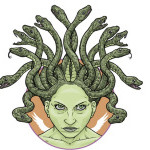Created by: Silentchapel
Number of Blossarys: 95
- There are no other language terms for this blossary.
- Traduire des termes
In Greek mythology, Hyperion ("The High-One") was one of the twelve Titan children of Gaia (Earth) and Uranus (Sky or Heaven) who, led by Cronus, overthrew Uranus and were themselves later ...
In Greek mythology, this world-ocean was personified as a Titan, a son of Uranus and Gaea. In Hellenistic and Roman mosaics, this Titan was often depicted as having the upper body of a muscular man ...
In Greek mythology, the Titans were a primeval race of powerful deities, descendants of Gaia (Earth) and Uranus (Sky), that ruled during the legendary Golden Age. They were immortal giants of ...
A cyclops (plural cyclopes), in Greek mythology and later Roman mythology, was a member of a primordial race of giants, each with a single eye in the middle of his forehead. The name is widely ...
The hecatoncheires, or hekatonkheires (singular: Hecatoncheir; "Hundred-Handed Ones"; Latinised Centimani), were figures in an archaic stage of Greek mythology, three giants of incredible ...
In Greek mythology, an oread or orestiad ("mountain") was a type of nymph that lived in mountains, valleys, and ravines. They differ from each other according to their dwelling: the Idaeae ...
In Greek mythology, the ourea ("mountains") were progeny of Gaia, members of the Greek primordial deities, who were the first-born elemental gods and goddesses, children of Gaia. The ten ...


 English (EN)
English (EN)